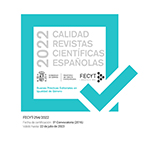“[U]nd Effi, Gott, unsere arme Effi ist ein Naturkind”: Effi Briest (1894) y el ideal de feminidad del Romanticismo Temprano a partir del ejemplo de Lucinde (1799)
Abstract
Este artículo propone un acercamiento a la protagonista de Effi Briest a partir del modelo de feminidad planteado en el Romanticismo Temprano. La caracterización de la heroína de Fontane al comienzo de la novela como Naturkind permite ponerla en relación con personajes románticos como Lucinde, figura que da nombre a la novela experimental de Friedrich Schlegel publicada en 1799. A fin de realizar esta lectura, se explora en primer lugar la visión de Schlegel sobre los sexos, el ideal de humanidad y el ideal de mujer en sus escritos teóricos, para posteriormente atender a la caracterización de su protagonista y las similitudes que Effi Briest guarda con esta. Los aspectos estudiados evidencian que Effi presenta semejanzas con el modelo de mujer romántico, planteado por Schlegel un siglo antes y que rompe con los moldes de su sociedad.
Downloads
##submission.format##
Lizenz
Um einen globalen Wissensaustausch zu fördern, gewährt die Zeitschrift für deutsche Philologie (RdFA) den Zugang ohne Beschränkungen, seit sie online veröffentlicht wird, deshalb ist sie eine Open Access- Zeitschrift. Die Complutense Universität ist im Besitz der publizierten Manuskripte dieser Zeitschrift und es ist rechtsverbindlich, bei jedem partiellen oder totalen Nachdruck diese bibliographische Referenz anzugeben. Die Artikel haben eine Lizenz Creative Commons (CC BY 4.0). Dieser Umstand muss auf diese Weise zitiert werden, wenn nötig. Informationen über die Version der Lizenz können jederzeit konsultiert werden.










